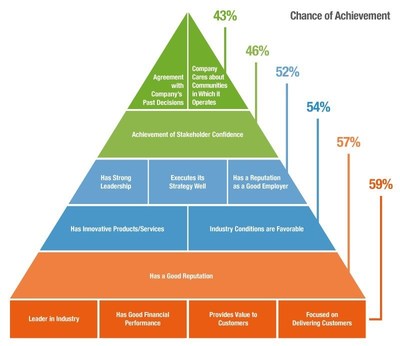| View printer-friendly version |
| Back |
|
FTI Consulting Study Shows that Confidence, not Reputation, is the Primary Driver of Stakeholder Behavior
|
The proprietary study surveyed U.S.-based investors, business-to-business ("B2B") customers, employees and public influencers regarding their attitudes about specific companies and their likelihood to engage in specific behaviors that include employees' tendencies to join or stay at a company, customers' inclination to buy products and services, investors' predisposition to purchase and hold stock in a firm and policymakers' and citizens' willingness to advocate for a company.
"A good reputation has long constituted the universal standard that a company should strive to enhance and protect, but the data plainly demonstrates that confidence is a far more significant driver of stakeholder behavior," said
On average, the study found that companies have a 30 percent better chance of achieving the desired behaviors if stakeholders are confident, than if stakeholders say the company has a good reputation. By increasing confidence, the study finds, companies can turn stakeholders into "advocates", something that a strong reputation alone does not accomplish. Once achieved, stakeholder confidence affords companies a better probability of attaining desired behaviors, such as:
- recommending goods and services to others (a 121 percent probability advantage for confidence);
- increasing the business relationship with the company (an 84 percent advantage for confidence);
- recommending the company as an employer (a 48 percent advantage for confidence);
- supporting the company operating in the community (a 38 percent advantage); and
- investing in the company (a 36 percent advantage).
"Our research finds that, for companies to build confidence, they should focus on telling their business story," explains
The study identified a Maslow-like hierarchy of attributes that includes a good reputation, while culminating in stakeholder confidence.

"A good reputation is important and, indeed, foundational," McGoldrick continued. "Our data plainly demonstrates that confidence in a company cannot be achieved unless, and until, it enjoys a good reputation among its key stakeholders. But, ultimately, companies will want to move beyond just building reputation and focus on building confidence."
The study reveals confidence to be a higher-order behavior than reputation. Stakeholder confidence was found to be on average 27 percent more difficult to achieve than a good reputation. Moreover, the study finds that stakeholders view a company's reputation to be a function of its past actions, whereas confidence is a forward-looking attribute that reflects stakeholders' belief in the integrity of its future actions.
Survey Methodology
About
+1.202.346.8800
Investor Contact
+1.617.747.1791
mollie.hawkes@fticonsulting.com
Media Contact
+1.202.728.8766
matthew.clark@fticonsulting.com
Photo - http://photos.prnewswire.com/prnh/20141111/157940-INFO
SOURCE